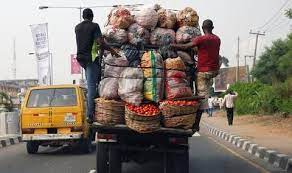NIGERIANS are in for a hard time as prices of food items and other products have continued to soar excessively in the last one year under the guise of dollar shortages and naira depreciation.
Except the prices of a 50-kilogramme (kg) bag of garri and rice each that have remained stable at N15,000 and N28,000 respectively during this period, findings by Nigerian Tribune show that the price of a 50-kg bag of beans soared by 122.22 per cent to N40,000 in August 2021 from N18,000 in August 2020.
Apart from beans, the price of a bag of pepper also rose by 100 per cent in August 2021 to N30,000 from N15,000 last year.
While the price of a 10kg bag of Semovita also increased by 47.06 per cent to N5,000 in August 2021 from N3,400 last year; the cost of a 25-litre keg of Palm oil jumped by 52 per cent to N19,000 from N12,500.
Findings also show that prices of other items/products such as flour, sugar, yam and Liquefied Petroleum Gas (LPG), popularly known as cooking gas, soared during this period.
According to a market survey, price of 50kg of flour rose by 61 per cent to N21,000 from N13,000 in August 2020; cost of 50kgbag of sugar climbed by 31.14 per cent to N22,950 from N17,500; and price of five tubers of average size yam rose to N7,500 from N4,500 last year.
A source of concern to the average Nigerian is the latest LPG – cooking gas’ price hike from N3, 200 per 12.5kg in August 2020 to N6,000 in 2021, representing 87.5 per cent increase in one year.
Speaking with Nigerian Tribune, a yam trader in Ketu-Alapere Market in Lagos, who identified herself as Mama Perpetual, said it was not retailers’ fault that prices of food items soared, blaming commodities price increase on economic and security challenges in the country.
She pointed out that due to security challenges, farmers in Benue, Kebbi, Zamfara, Nasarawa states and other northern parts of the country were unable to farm extensively in the last one year.
Besides, she added that it was even difficult to transport products such as yam, beans, onions, pepper and tomatoes to the South due to the risks of kidnappings and various extortions on the roads.
According to her, demand for a few commodities that eventually got to the markets was more than supply. The trader blamed the Federal Government for the current hike in the price of cooking gas. If this trend continues, the woman said, it would compel most Nigerians to return to the era of charcoal and firewood for cooking.
Another person, Mrs. Bose Badmus, a plantain seller, said the product has been so scarce that a bunch of plantain she bought for N1,200 last year now cost N2,000 naira.
In his analysis in September’s LBS Executive Breakfast Session last week, the Managing Director, Financial Derivatives Company Limited, Mr Bismarck Rewane, pointed out that commodity prices rose by an average of 52.78 per cent last year.
He also noted a major hike in the price of a loaf of bread presently. Giving analysis about what goes into a loaf of bread, Rewane pointed out that prices of flour have been up by 61.54 per cent, baking powder and fortifier – 25 per cent, yeast -15.0 per cent, sugar -31.14 per cent, margarine – 55 per cent.
According to him, imported commodity prices have been rising on dollar shortages (flour), adding that wheat and sugar are now being considered for forex restrictions list. He said that a cooking gas import tax of 7.5 per cent is currently being implemented. Despite the fact that domestic inflation has been down, Rewane said that food prices have gone up.
According to Rewane, the divergence between official inflation data and market reality was due to outside lag (time lag between policy implementation and impact on the market); consumer price resistance as 50 per cent of Nigerians reduced food consumption; and cross elasticity of demand, explaining that manufacturers now resorting to local substitutes while reducing supply to retail markets.
Source: Tribune Newspaper


